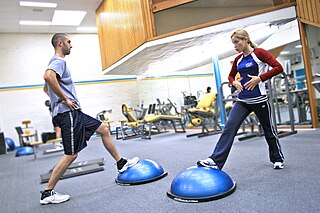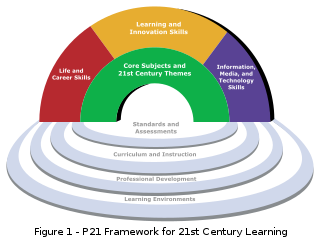Related Research Articles

Vocational education is education that prepares people to a skilled craft as an artisan, trade as a tradesperson, or work as a technician. Vocational education can also be seen as that type of education given to an individual to prepare that individual to be gainfully employed or self employed with requisite skill. Vocational education is known by a variety of names, depending on the country concerned, including career and technical education, or acronyms such as TVET and TAFE.

A personal trainer is an individual who creates and delivers safe and effective exercise programs for healthy individuals and groups, or those with medical clearance to exercise. They motivate clients by collaborating to set goals, providing meaningful feedback, and by being a reliable source for accountability. Trainers also conduct a variety of assessments beginning with a preparticipation health-screening and may also include assessments of posture and movement, flexibility, balance, core function, cardio-respiratory fitness, muscular fitness, body composition, and skill-related parameters to observe and gather relevant information needed to develop an effective exercise program and support client goal attainment.

Training is teaching, or developing in oneself or others, any skills and knowledge or fitness that relate to specific useful competencies. Training has specific goals of improving one's capability, capacity, productivity and performance. It forms the core of apprenticeships and provides the backbone of content at institutes of technology. In addition to the basic training required for a trade, occupation or profession, training may continue beyond initial competence to maintain, upgrade and update skills throughout working life. People within some professions and occupations may refer to this sort of training as professional development. Training also refers to the development of physical fitness related to a specific competence, such as sport, martial arts, military applications and some other occupations.
National Vocational Qualifications (NVQs) are practical work-based awards in England, Wales, and Northern Ireland that are achieved through assessment and training. The regulatory framework supporting NVQs was withdrawn in 2015 and replaced by the Regulated Qualifications Framework (RQF), although the term "NVQ" may be used in RQF qualifications if they "are based on recognised occupational standards, work-based and/or simulated work-based assessment, and where they confer occupational competence".
The City and Guilds of London Institute is an educational organisation in the United Kingdom. Founded on 11 November 1878 by the City of London and 16 livery companies – to develop a national system of technical education, the institute has been operating under royal charter (RC117), granted by Queen Victoria, since 1900. The Prince of Wales, later King Edward VII, was appointed the first president of the institute.
A national qualifications framework (NQF) is a formal system describing qualifications. 47 countries participating in the Bologna Process are committed to producing a national qualifications framework. Other countries not part of this process also have national qualifications frameworks.
Recognition of prior learning (RPL), prior learning assessment (PLA), or prior learning assessment and recognition (PLAR), describes a process used by regulatory bodies, adult learning centres, career development practitioners, military organizations, human resources professionals, employers, training institutions, colleges and universities around the world to evaluate skills and knowledge acquired outside the classroom for the purpose of recognizing competence against a given set of standards, competencies, or learning outcomes. RPL is practiced in many countries for a variety of purposes, for example an individual's standing in a profession, trades qualifications, academic achievement, recruitment, performance management, career and succession planning.

Teacher education or teacher training refers to programs, policies, procedures, and provision designed to equip (prospective) teachers with the knowledge, attitudes, behaviors, approaches, methodologies and skills they require to perform their tasks effectively in the classroom, school, and wider community. The professionals who engage in training the prospective teachers are called teacher educators.
Competence is the set of demonstrable characteristics and skills that enable and improve the efficiency or performance of a job. Competency is a series of knowledge, abilities, skills, experiences and behaviors, which leads to effective performance in an individual's activities. Competency is measurable and can be developed through training.
The Technical and Vocational Training Corporation (TVTC) is a training institute in Saudi Arabia. In existence since 23 June 1980, it has branches in all major Saudi cities.
A training package is a set of nationally endorsed training standards, qualifications and guidelines in Australia.
Training and development involve improving the effectiveness of organizations and the individuals and teams within them. Training may be viewed as related to immediate changes in organizational effectiveness via organized instruction, while development is related to the progress of longer-term organizational and employee goals. While training and development technically have differing definitions, the two are oftentimes used interchangeably and/or together. Training and development have historically been topics within adult education and applied psychology but have within the last two decades become closely associated with human resources management, talent management, human resources development, instructional design, human factors, and knowledge management.
The Association for Talent Development (ATD), formerly American Society for Training & Development (ASTD), is a non-profit association serving those who develop talent in the workplace.
The National Training System is the Australian system for vocational education and training (VET) under the Australian Quality Training Framework (AQTF), in which employers, the States of Australia, and the Commonwealth Government, formalise a curriculum available for Registered Training Organisations (RTOs) to teach and assess the competency of students.

Riyadh College of Technology (RCT) (Arabic: الكلية التقنية بالرياض) is a public institute of technology in Riyadh, Saudi Arabia. It was established in 1983 during the reign of King Fahd bin Abdulaziz and is the first intermediate technical college in Saudi Arabia. It was founded under the supervision of Saudi Technical and Vocational Training Corporation and offers courses in multiple streams like electrical, electronics, automobile and management technology.
The Technical and Vocational Education Initiative (TVEI) was an initiative in education in the United Kingdom in the 1980s
The Computing Technology Industry Association, more commonly known as CompTIA, is an American non-profit trade association that issues professional certifications for the information technology (IT) industry. It is considered one of the IT industry's top trade associations.

College SA is a Distance Learning Private and Business College, located in Tygervalley Bellville, South Africa. College SA offers Business, Technical and Vocational Education and Training (TVET) to students, both in South Africa and internationally.

21st century skills comprise skills, abilities, and learning dispositions that have been identified as being required for success in 21st century society and workplaces by educators, business leaders, academics, and governmental agencies. This is part of a growing international movement focusing on the skills required for students to master in preparation for success in a rapidly changing, digital society. Many of these skills are also associated with deeper learning, which is based on mastering skills such as analytic reasoning, complex problem solving, and teamwork. These skills differ from traditional academic skills in that they are not primarily content knowledge-based.
TVET refers to all forms and levels of education and training which provide knowledge and skills related to occupations in various sectors of economic and social life through formal, non-formal and informal learning methods in both school-based and work-based learning contexts. To achieve its aims and purposes, TVET focuses on the learning and mastery of specialized techniques and the scientific principles underlying those techniques, as well as general knowledge, skills and values.
References
- ↑ Google Ngram: "technical trainer"
- ↑ Air of Authority - A History of RAF Organisation - RAF Home Commands formed between 1939 - 1957 Archived 2011-01-11 at the Wayback Machine
- ↑ Smith, Darryl P. "Selecting and preparing effective trainers." Modern Casting. American Foundry Society, Inc. 1999.
- ↑ Technical Instructors Skill Standards.pdf [ permanent dead link ]
- ↑ Marope, P.T.M.; Chakroun, B.; Holmes, K.P. (26 May 2015). Unleashing the potential: transforming technical and vocational education and training. UNESCO Publishing. p. 114. ISBN 978-92-3-100091-1.
- ↑ Gauld, D. & Miller, P. (2004), 'The qualifications and competencies held by effective workplace trainers', Journal of European Industrial Training, vol. 28, no. 1, pp.8-22.
- ↑ "CompTIA and Technical Communities Partner for Government Access to Certifications.", Health & Beauty Close-Up. Close-Up Media, Inc. 2009.
- 1 2 Professional Organizations for Trainers, Mr PBET blog, Richard Goutal.